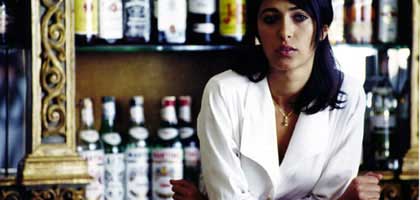Rain is an inertia that takes my whole body.
As it drizzles I slump, curving against the side of the car door. I am dry so it must be interior versus exterior, serendipity versus murphy’s law. When it’s like this my body hasn’t enough energy
all I can do, sitting in the passenger seat
is to allow myself to focus
on that one
single raindrop––the one fighting gravity. It’s timid as it streams down the glass, refusing to join the rush of others. I become devoted. Its reluctant progress is my reluctant state. I am stuck here anyway as the rain pelts the metal body that is my shelter so in a way I’ve agreed to wait, I want to see it slip beyond my eyes.
the door–slams,
rustle, click,
and it’s gone.
wiped away by the steady rhythm of the wipers.
Paolo Sorrentino’s feature, Consequences of Love (2004), opens with a rhythmic injection of just that type of rain soaked lethargy.
The screen is washed in a sterile blue and a lone figure inches diagonally across the frame. The music is hollow, an echo that wisps, magnetic like breathing underwater.
We wait––it’s the polite thing to do––and it doesn’t take as much effort as we imagine it would, in fact it’s kind of riveting, the sluggish motion of the walkway as it carries a man across the screen. Lali Puna is hypnotic, resonating with a feeling of almost nothing. But it’s a singular moment of symbiosis between music and image that creates a caustic irony to the opening sequence. The proverbial scrape of the windshield wipers. Just as we are about to see our skittish rain drop finally plunge beyond our vision, the moment is ruptured by the deafening sound of reality. The walkway gurgles, the valet comes to life, and we are met with a resolute silence. Then a casual pulse, the cocktail shaker, and our first introduction to the protagonist, Titta di Girolamo (Toni Servillo).
The opening sequence is definitive to the film’s unique quality of music. Consequences of Love is about waiting, and here waiting pulsates. Music is physically manipulated while at the same time being physiologically manipulative. Silence and sound are filtered, amplified and fractured to the point that the electro-pop/synthetic fusions, and even the brief appearances of classical Italian pop, create a sense of discordancy and humorous absurdity. Thematic gangster sequences that share the foreboding threats of a scene from The Godfather are dressed with the vocals of Ornella Vanoni (the Madonna of Italian pop). Suddenly music mocks the gravity of the situation as the passenger-side gangster sings-along, detailing the ingredients of “love”.
The music of Lali Puna, Terra Nova & I.S.A.N. satirizes reality in a different way. Just as the rhythms of the music settle into our periphery the film world capsizes into an almost auditory slapstick. These “clumsy” transitions from a rich harmonic to the rude noises of the world around us are effective throughout the film (think back to the opening sequence). A scene early on shows Titta ascend to his room to the electronica of ISAN’s SCOOP. We follow the routine of his motions until the view outside his window breaks our revere with an almost Chaplinesque insert; a man walking by stares distractedly at a beautiful women and as a result walks into a pole [grotesque sound effect included]. In another sequence, the delivery of a large set of laundered bank notes, cut to the music of Terranova, is ruined by the bell-boy who misses the elevator, effectively cutting off the music and leaving him to awkwardly radio the bank for the lift.
Why the dreamy music? Why the lifeless place? Sorrentino’s film is driven by a soundscape that is at once awake and asleep. The delirium of time passed, anonymity, damaged humor and force may suffocate the protagonist, but the varnish of broken beats and pop-melodies refuse to numb the mind. Perhaps the consequences of love a—-
rustle, click,
and it’s gone.
You can view the Opening Sequence here.

Consequences of Love (2004)
Directed by Paolo Sorrentino
Starring Toni Servillo
Music
Lali Puna, Scary World Theory (opening sequence)
Terranova, Concepts
I.S.A.N., Remegio
Ornella Vanoni, Rossetto e cioccolato
